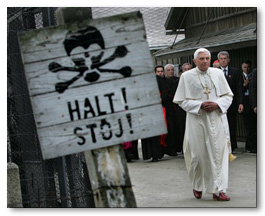Marking evils deepest roots
- FATHER RAYMOND J. DE SOUZA
We so cavalierly use the past for our present purposes that it is remarked when someone demurs from doing so. Pope Benedict XVI went to Auschwitz last Sunday and delivered an address that was as breathtaking in its scope as it was heartrending in its poignancy.
 |
He did not do what we do too facilely in Canada — namely, use the past for some political purpose or other. No one bats an eye when our historical manipulators, with sprinkles of apologies and dollops of reparations, blithely sit in judgment on our predecessors, condemning entire generations with scant regard for the actual truth of what happened. The truth of history is complicated, but we want to make it simple to fit a storyline that is convenient for today.
Benedict had more than convenience in mind. He called himself a “son of the German people” at Auschwitz. For those with the eyes to see the broad sweep of history, it was a moment laden with the weight of generations. He allowed that weight to sit fully upon himself, not shifting it immediately to the more comfortable ground of inveighing against contemporary anti-Semitism. He did not speak of national guilt or collective responsibility of the German people. The path of ostentatious contrition is too often an evasion — if all are guilty, then no one in particular is.
Instead, he asked those listening to him to look hard at the reality of Auschwitz — what he called “the place of the Shoah” — in the full depth of its horror, and to see what it most profoundly says about those who orchestrated it, and about its principal victims, the Jews.
What he said is something even his great predecessor, Pope John Paul II, did not say. John Paul said that when man turns against God — as did the totalitarian atheism of Nazi Germany — then he soon turns against his fellow man. Benedict radically extended that analysis, saying that it was precisely hatred for God that led to the attempt to annihilate God’s chosen people.
On Monday, a lengthy excerpt of his speech was published in the Post. The following was not included, but is also worth quoting at length. It is a remarkable statement of God’s continuing election of the Jewish people, and a theological reading of the Shoah.
“It is as if Benedict wanted to avoid exploiting Auschwitz as a backdrop for any contemporary cause, however noble, and instead wanted to penetrate to what he considers its deepest roots — the primitive human instinct to slay God as the final limit on earthly power,” Allen wrote. |
“The rulers of the Third Reich wanted to crush the entire Jewish people, to cancel it from the register of the peoples of the earth,” said Benedict. “Thus the words of the Psalm, ‘We are being killed, accounted as sheep for the slaughter,’ were fulfilled in a terrifying way. Deep down, those vicious criminals, by wiping out this people, wanted to kill the God who called Abraham, who spoke on Sinai and laid down principles to serve as a guide for mankind, principles that are eternally valid.”
“If this people, by its very existence, was a witness to the God who spoke to humanity and took us to himself, then that God finally had to die and power had to belong to man alone — to those men, who thought that by force they had made themselves masters of the world,” the Pope continued. “By destroying Israel, by the Shoah, they ultimately wanted to tear up the taproot of the Christian faith and to replace it with a faith of their own invention: faith in the rule of man, the rule of the powerful.”
Benedict’s words give the Holocaust a dimension that addresses honestly its full historical depth. It rings with the wisdom of the Torah, that the Jewish people, elected by God, were called in Abraham to be a witness that there were no other gods, including those constructed by the powers of this earth.
Critics of Benedict’s address, reading it through the lenses of contemporary politics, missed this deeper dimension. But my friend John Allen, Vatican correspondent for the National Catholic Reporter, was on the papal trip and captured the scope of what Benedict was saying.
“It is as if Benedict wanted to avoid exploiting Auschwitz as a backdrop for any contemporary cause, however noble, and instead wanted to penetrate to what he considers its deepest roots — the primitive human instinct to slay God as the final limit on earthly power,” Allen wrote.
The powerful do not like limits on their power. Therefore, those who would slay God — or at least the God of Abraham, Isaac and Jacob, who puts limits to the rule of Caesar — must turn against those who bear witness to Him. Benedict spoke of those Christian martyrs who died at Auschwitz — St. Maximilian Kolbe and St. Teresa Benedicta of the Cross. His entire address intimated a broader martyrdom, that of the whole Jewish people as God’s special witnesses.
Their witness is the truth of the past. It is not for us to use for our purposes today; rather, it is for us to learn, to respect, to honour and to heed.
 This is J. Fraser Field, Founder of CERC. I hope you appreciated this piece. We curate these articles especially for believers like you.
This is J. Fraser Field, Founder of CERC. I hope you appreciated this piece. We curate these articles especially for believers like you.
Please show your appreciation by making a $3 donation. CERC is entirely reader supported.

Acknowledgement
Father Raymond J. de Souza, "Marking evil’s deepest roots." National Post, (Canada) June 1, 2006.
Reprinted with permission of the National Post and Fr. de Souza.
The Author
Father Raymond J. de Souza is the founding editor of Convivium magazine.
Copyright © National Post

